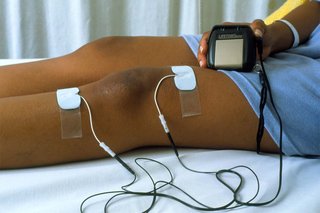What TENS is for
TENS can help relieve certain types of short-term and long-term pain such as:
- period pain
- labour pain in pregnancy
- pain caused by a sports injury
- pain caused by a condition like arthritis or endometriosis
It’s thought to work by encouraging your body to release natural painkillers called endorphins and by stopping pain messages from your nerves reaching your brain.
TENS does not work for everyone.
If you're not sure what’s causing your pain, see a healthcare professional before using a TENS machine.
Important
Do not use TENS if:
- you have epilepsy
- you have a pacemaker
- you’re pregnant, unless your doctor or midwife tells you to
How to get a TENS machine
If you want to try TENS for pain relief, it's a good idea to check with a GP or other healthcare professional first, to make sure TENS is safe for you.
You can buy a TENS machine online, or in pharmacies and shops selling electrical items. You may also be able to hire a TENS machine online or from a local pharmacy.
Check for a European CE mark or UKCA mark, as this means it meets the right standards.
How to use a TENS machine

A TENS machine is a small, portable device with a battery. It has wires with sticky pads that you put on your skin.
- Make sure the TENS machine is turned off before you start.
- Use the controls to set the electric current.
- Plug the electrical wires into the machine.
- Place the sticky pads onto clean skin, near the painful parts of your body. Leave a gap between the pads.
- Turn the TENS machine on.
- Turn the dial slowly until you feel a tingling sensation. It should not be painful.
A healthcare professional, such as a GP, physiotherapist or midwife can advise you if you're not sure where to put the sticky pads. They can also tell you about alternatives if your skin is sensitive to the sticky pads.
If your skin becomes itchy, irritated or red (redness may be harder to see on brown or black skin), turn off the machine and remove the pads.
There are some things you should not use TENS for. Read the leaflet that comes with your machine for the full list and for further information about how to use TENS.
Check with a healthcare professional if you’re not sure.
Don't
-
Do not use TENS on irritated, broken, infected or numb areas of skin
-
Do not use TENS on your neck, mouth or eyes
-
Do not use TENS on your chest and back at the same time
-
Do not use TENS while you sleep
-
Do not use TENS in the bath or shower
-
Do not use TENS when driving or using tools or machinery
Page last reviewed: 14 February 2025
Next review due: 14 February 2028